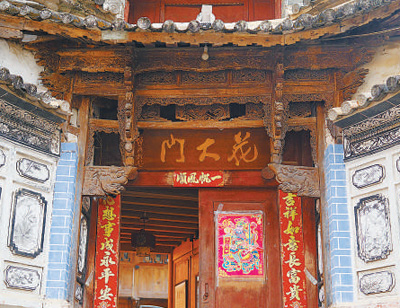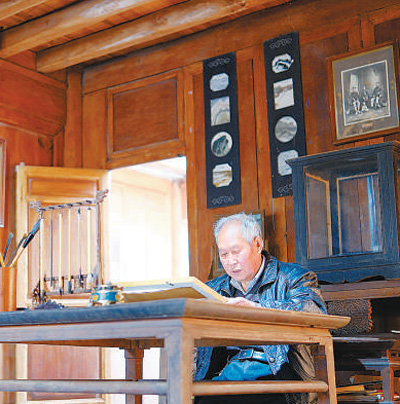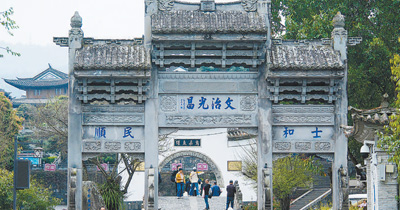




- BRNN
- BRI News
- BRNN News
- Database
Official Documents Polices and Regulations
Inter-government Documents International Cooperation BRI Countries
Business Guide Economic Data BRI Data
Trade
Investment Projects Latest projects
Cases - Content Pool
Heshun, an ancient town in southwest China's Yunnan Province, is known as the hometown of overseas Chinese in the region.

Photo shows an exterior view of Heshun Library in Heshun town, Tengchong, a county-level city administered by Baoshan city, southwest China's Yunnan Province. (People's Daily Online/Zhuang Zhibin)
Located in Tengchong, a county-level city administered by Baoshan city, Heshun has a registered population of only 7,000. Remarkably, more than 30,000 overseas Chinese living in over 10 countries and regions, including Myanmar, Thailand, the United States, and Canada, trace their ancestry back to the town.
Heshun is an important stop along an economic and trade route of the Silk Road in southwest China.

Photo shows an exterior view of Yin Xianzhang's home in Heshun town, Tengchong, a county-level city administered by Baoshan city, southwest China's Yunnan Province. (People's Daily Online/Zhuang Zhibin)
By the early 20th century, over 10,000 mules and horses transported goods from more than 30 countries on this ancient route every day. Among nearly 100 businesses founded by Heshun natives, over 60 grew into multinational companies, with branches across major Chinese commercial ports and throughout South Asia and Southeast Asia.
"Silk and agricultural specialties from China were sold to Myanmar, while European imported goods and Myanmar's cotton and jade were marketed in China," said Li Jidong, a Heshun native with a passion for studying local history who has contributed to several publications.
Today, Heshun preserves over 100 ancient residences, including one owned by the Yin family. The home of 80-year-old Yin Xianzhang is furnished with international goods: an Italian wall clock in the living room, a British sewing machine in one corner, iron railings from England on the balcony, and a German gas stove in the cabinet.

Yin Xianzhang browses old photos at his home in Heshun town, Tengchong, a county-level city administered by Baoshan city, southwest China's Yunnan Province. (People's Daily Online/Zhuang Zhibin)
"I often watched my grandfather use this gas stove to boil water for tea when I was young," said Yin Xianzhang, who spent his childhood in Myanmar with his father. His grandfather began with a small business in Myanmar, eventually partnering with fellow townsmen to establish a company. After generations of effort, the family built this three-story mansion in the town.
Homes filled with goods from around the world reflect the deep impact of international exchanges in Heshun. Architecture, cuisine, language, and clothing all tell stories of cultural inclusiveness, exchanges and mutual learning between civilizations in the town.

Photo shows a view of Heshun town, Tengchong, a county-level city administered by Baoshan city, southwest China's Yunnan Province. (People's Daily Online/Zhuang Zhibin)
Heshun natives who went abroad also brought back advanced technologies and concepts. They imported lead and lithographic printing presses to open printing houses, donated to establish Yiqun Middle School, and even built China's own match factory, breaking the monopoly once held by Swedish and Japanese manufacturers.
"Heshun natives who ventured abroad witnessed global development firsthand, which deepened their awareness of education's importance. This inspired them to contribute voluntarily to build a library in their hometown," said Cun Yu, curator of Heshun Library, which was known as the town's "press center."
The integration of diverse cultures has broadened the outlook of people in Heshun, guiding generations of residents to venture beyond their hometown and engage with the wider world, Cun added.

Photo shows Li Jidong in front of his home in Heshun town, Tengchong, a county-level city administered by Baoshan city, southwest China's Yunnan Province. (People's Daily/Hou Lulu)
Today, Yin Xianzhang's son, Yin Cangding, operates a homestay in their ancestral home. "In recent years, the government has promoted tourism development. We modernized our old house to welcome guests, and business has been booming," he said.
"Compared to our ancestors, Heshun residents today enjoy much better living conditions and no longer go abroad out of necessity. Young people now travel overseas to explore the world," Yin Cangding added, while flipping through the family genealogy. The Yin family now has nearly 100 members living overseas.
Copies of a magazine about the ancient town are displayed in Heshun Library. With a history spanning nearly a century, this publication is still in print, with staff members regularly sending issues to overseas Chinese communities.
Li Zuqing is both a loyal reader and contributor to the magazine. A third-generation Chinese born in Mandalay, Myanmar, Li has dedicated his life to fostering cultural and educational ties between China and Myanmar. He founded a school in Mandalay, opened the country's first Confucius Classroom, and developed 56 Chinese language centers across Myanmar, serving over 5,000 students.

Photo shows a distant view of Heshun town, Tengchong, a county-level city administered by Baoshan city, southwest China's Yunnan Province. (People's Daily Online/Zhuang Zhibin)
Today, Tengchong, where Heshun is located, is home to the national first-class Houqiao Port and three provincial-level border crossings. The city remains a vital hub for economic cooperation and cultural exchanges between China and its neighbors.
At Houqiao Port, about 70 kilometers northwest of Heshun, trucks deliver fresh fruit like bananas and watermelons from Myanmar to China, and carry Chinese-made goods and construction materials back.
The upgrade of the secondary highway linking Houqiao Port to Myitkyina in Myanmar cuts travel time for the 200-kilometer journey from eight hours to just three, vastly improving the efficiency of cross-border trade and travel.

Tel:86-10-65363107, 86-10-65368220, 86-10-65363106